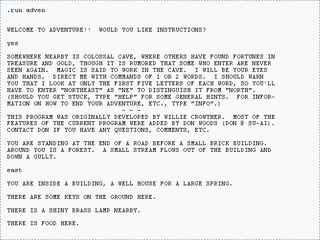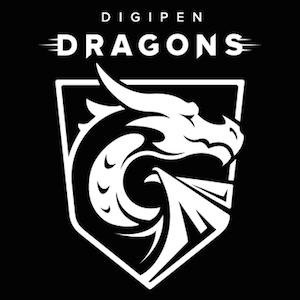Infocom was an American software company based in Cambridge, Massachusetts, that produced numerous works of interactive fiction. They also produced a business application, a relational database called Cornerstone.

Interactive fiction, often abbreviated IF, is software simulating environments in which players use text commands to control characters and influence the environment. Works in this form can be understood as literary narratives, either in the form of interactive narratives or interactive narrations. These works can also be understood as a form of video game, either in the form of an adventure game or role-playing game. In common usage, the term refers to text adventures, a type of adventure game where the entire interface can be "text-only", however, graphic text adventures still fall under the text adventure category if the main way to interact with the game is by typing text. Some users of the term distinguish between interactive fiction, known as "Puzzle-free", that focuses on narrative, and "text adventures" that focus on puzzles.

Zork is a text-based adventure game first released in 1977 by developers Tim Anderson, Marc Blank, Bruce Daniels, and Dave Lebling for the PDP-10 mainframe computer. The original developers and others, as the company Infocom, expanded and split the game into three titles—Zork I: The Great Underground Empire, Zork II: The Wizard of Frobozz, and Zork III: The Dungeon Master—which were released commercially for a range of personal computers beginning in 1980. In Zork, the player explores the abandoned Great Underground Empire in search of treasure. The player moves between the game's hundreds of locations and interacts with objects by typing commands in natural language that the game interprets. The program acts as a narrator, describing the player's location and the results of the player's commands. It has been described as the most famous piece of interactive fiction.

Steven Eric Meretzky is an American video game developer. He is best known for creating Infocom games in the early 1980s, including collaborating with author Douglas Adams on the interactive fiction version of The Hitchhiker's Guide to the Galaxy, one of the first games to be certified "platinum" by the Software Publishers Association. Later, he created the Spellcasting trilogy, the flagship adventure series of Legend Entertainment. He has been involved in almost every aspect of game development, from design to production to quality assurance and box design.

The Game Developers Conference (GDC) is an annual conference for video game developers. The event includes an expo, networking events, and awards shows like the Game Developers Choice Awards and Independent Games Festival, and a variety of tutorials, lectures, and roundtables by industry professionals on game-related topics covering programming, design, audio, production, business and management, and visual arts.

Microsoft XNA is a freeware set of tools with a managed runtime environment that Microsoft developed to facilitate video game development. XNA is based on .NET Framework, with versions that run on Windows and Xbox 360. XNA Game Studio can help develop XNA games. The XNA toolset was announced on March 24, 2004, at the Game Developers Conference in San Jose, California. A first Community Technology Preview of XNA Build was released on March 14, 2006.

DigiPen Institute of Technology is a private for-profit university in Redmond, Washington. It also has campuses in Singapore and Bilbao, Spain. DigiPen offers bachelor's and master's degree programs. It also offers summer programs for students in grades K-12, online courses, and year-long high school programs.
Tim Anderson is an American computer programmer best known for co-creating the adventure game Zork, one of the first works of interactive fiction and an early descendant of ADVENT.
GameSpot is an American video gaming website that provides news, reviews, previews, downloads, and other information on video games. The site was launched on May 1, 1996, created by Pete Deemer, Vince Broady and Jon Epstein. In addition to the information produced by GameSpot staff, the site also allows users to write their own reviews, blogs, and post on the site's forums. It has been owned by Fandom, Inc. since October 2022.

Arthur: The Quest for Excalibur is an illustrated interactive fiction video game written by Bob Bates and published by Infocom in 1989. It was released for the Apple II, Amiga, Macintosh, and IBM PC compatibles. Atypically for an Infocom product, it shows illustrations of locations, characters and objects within the game. It is Infocom's thirty-fourth game and is the second of two Infocom games developed by Challenge using Infocom's development tools.

Ellen Guon Beeman is an American fantasy and science fiction author, television screenwriter and computer game designer/producer. She has published four novels and has worked on over 40 video games.

Robert Bates is an American computer game designer. One of the early designers of interactive fiction games, he was co-founder of Challenge, Inc., which created games in the 1980s for the pioneering company Infocom. After Infocom's dissolution in 1989, Bates co-founded Legend Entertainment to continue publishing games in the Infocom tradition, but with added graphics. Notable games that he has designed, written, or produced include Unreal II (2003), Spider-Man 3 (2007), and Eric the Unready (1993), listed as Adventure Game of the Year by Computer Gaming World magazine and also included on the 1996 list of "150 best games of all time". In 1998 he wrote the award-winning game Quandaries for the U.S. Department of Justice. He has twice been the chairperson of the International Game Developers Association, which honored him with a Lifetime Achievement Award in 2010. Bates has written extensively about game design and development in works such as the 2001 book Game Design: The Art and Business of Creating Games, which is commonly used as a game design textbook in college courses. From 2011–2014, Bates was Chief Creative Officer for External Studios at Zynga. He continues to work as an independent consultant with various publishers in the games industry.
Michael Berlyn was an American video game designer and writer. He was best known as an implementer at Infocom, part of the text adventure game design team. He is also known as the designer behind Bubsy in Claws Encounters of the Furred Kind (1993) and Bubsy 3D (1996).

The Academy of Interactive Entertainment (AIE) is an Australian video games and computer animation school. Founded in 1996, it was one of the world's first institutions to offer qualifications in these industries. The AIE provides courses covering CGI, animation, video game asset creation and games programming. Campuses are located in Canberra, Sydney, Melbourne, Adelaide, and an online campus. The Australian ABC has said that the AIE "is one of Australia's most awarded 3D animation, game design and visual FX educators".

Michael Alyn Pondsmith is an American roleplaying, board, and video game designer. He is best known for founding the publisher R. Talsorian Games in 1982, where he developed a majority of the company's role-playing game lines. Pondsmith is the author of several RPG lines, including Mekton (1984), Cyberpunk (1988) and Castle Falkenstein (1994). He also contributed to the Forgotten Realms and Oriental Adventures lines of the Dungeons & Dragons role-playing game, worked in various capacities on video games, and authored or co-created several board games. Pondsmith also worked as an instructor at the DigiPen Institute of Technology.
GameTrailers TV with Geoff Keighley is a television show about video games hosted by video game journalist Geoff Keighley. Originally titled Game Head, on January 25, 2008, the show relaunched under its current name with a slightly different format and further incorporation of GameTrailers hosts, Amanda MacKay and Daniel Kayser. The series airs Friday nights at different times at 12am, 12:30am, 1am, and 1:30am Eastern Time on Spike in the U.S. and Canada.
Visual3D Game Engine is a 3D game engine and game development tool written entirely in C# and built for the .NET Framework, with development of its 3D rendering engine first beginning in 2003.

Microsoft XNA Game Studio is a discontinued integrated development environment (IDE) for building video games on the Microsoft XNA platform. Such video games can run on Xbox 360, Microsoft Windows, Windows Phone and the Zune. XNA Game Studio is targeted at hobbyists and experienced programmers, and is primarily used to develop 2D and 3D video games for various Microsoft platforms. XNA games can be published for the Xbox 360 using an XNA Creator's Club membership, that has a yearly fee.

Nate Martin is an American entrepreneur, game designer, and software executive. He is the Co-founder and CEO of Puzzle Break, the first American room escape company. He is often referred to as the "Founding Father of Escape Rooms." He is an alumnus of the DigiPen Institute of Technology with a Bachelor of Science in Real-Time Interactive Simulation and Computer Science.
Jeb Havens is a game designer, video game developer, industry activist and singer-songwriter. He has worked for companies such as Cyberlore, Electronic Arts (EA), and Google, and is known for his work in video games such as Playboy: The Mansion, Disney Princess: Magical Jewels, and the Spore series. Havens designed several party games throughout his career, including the 2021 board game Uk'otoa published by Darrington Press. As a recording artist, Havens released his debut album in 2016.












